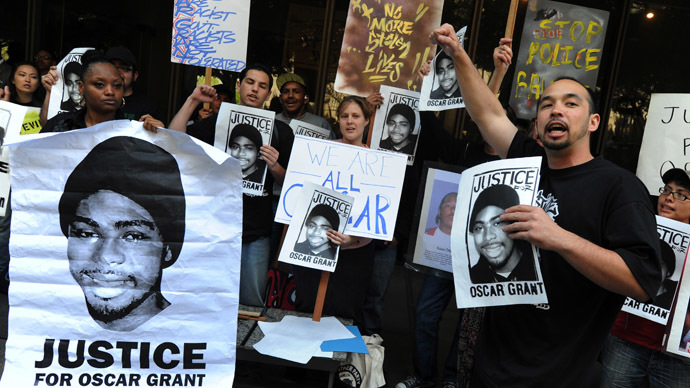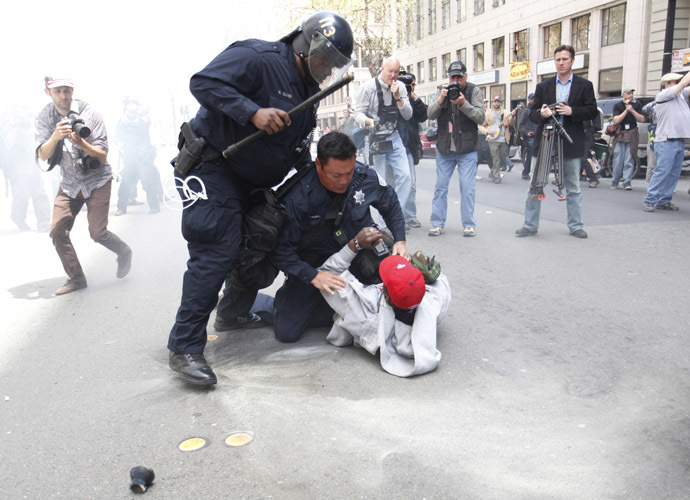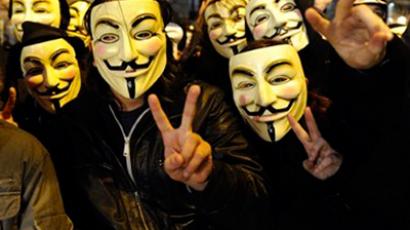Oakland, county pay $1mn settlement over heavy-handed policing of protesters

The City of Oakland and Alameda County have agreed to settle a class action lawsuit by paying out $1.025 million to 152 people arrested in 2010 while protesting the leniency of sentence for a white transit officer who shot dead an unarmed black man.
City Council members voted to approve a settlement of $850,000,
Oakland City attorney's spokesman Alex Katz said, while Alameda
County will pay out $175,000 to put a class action lawsuit filed
by the National Lawyers Guild to rest.
The deal received preliminary approval from District Judge
Thelton Henderson of San Francisco on June 13, but must clear a
final approval hearing slated for September.
The settlement of the case potentially brings to conclusion one
of three class action lawsuits resulting from the Oakland Police
Department’s (OPD) reaction to protests stemming from the Oscar
Grant case and Occupy Oakland.

The arrests were made at a November 2010 rally staged to protest
the lenient sentencing of Johannes Mehserle, a Bay Area Rapid
Transit [BART] police officer who fatally shot Oscar Grant on a
train platform on New Year day in 2009.
Mehserle received a two-year prison term for involuntary
manslaughter after shooting Grant in the back, as he was
allegedly resisting arrest while unarmed and lying prostrate on
the platform. The shooting drew nationwide media attention and a
dramatization of the last 24 hours of Grant’s life premiered
earlier this year.
According to the lawsuit, both the city and county failed to
follow state law or their own rules during the detention and
arrest of protesters after police intervened to halt a planned
march to a nearby BART station on November 5, 2010.
Protesters then said after being detained, they were forced to
sit in Alameda County Sheriff's Office buses and later in holding
cells for up to 24 hours without ever being formally booked.
One of the plaintiffs, National Lawyers Guild legal observer Dan
Spalding, said in a statement the protesters were never given a
warning or an opportunity to leave.
“I tried to tell the officers that I was a legal observer, but
they handcuffed me and put me on a sheriff’s bus,” local
affiliate CBS San Francisco cites Spalding as saying.
"We brought the lawsuit in order to protect the constitutional
right to dissent in Oakland," said Rachel Lederman, lead
attorney in the case for the National Lawyers guild.
The four named plaintiffs in the case will receive $9,000 under
the settlement, Lederman said. Others in the class action suit
can apply to receive around $4,500 apiece. The attorneys will get
$300,000.
OPD under fire
In the other two cases related to both the slaying of Grant and
Occupy Oakland, police have been accused of using excessive force
and unlawful mass arrests during demonstrations on October 25,
2011, November 2-3, 2011, and January 28, 2012.
In the January 28 incident, police arrested more than 400 people
outside the Downtown Oakland YMCA.
In July, the Oakland City Council is set to consider a proposed
settlement resulting from police violence during the November
2011 protest.
Shortly before 1am on November 3, Scott Campbell was shot by
police with a less-lethal round while filming a stationary police
line during an Occupy Oakland protest. The shooting,
incidentally, was documented from a point-of-view perspective by
Campbell’s own camera.
University of South Carolina criminal justice Professor Geoffrey
Alpert told the Oakland Tribune that, "Unless there's a threat
that you can't see in the video, that just looks like absolute
punishment, which is the worst type of excessive force."














